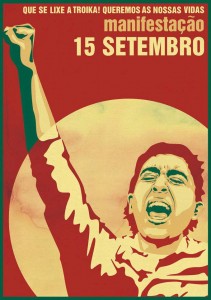This post is part of our special coverage Europe in Crisis.
The Portuguese government led by Pedro Passos Coelho is increasingly distancing itself from its electoral promises and from the path which it promised to follow during the election period, generating a wave of discontent which is manifesting itself primarily on the social networks.
On the night of 7 September, 2012, the Prime Minister gave an address [pt] to the country, broadcast live on public television, shortly before the broadcast of a football match, announcing more austerity measures which were immediately discussed by some Twitter users through the hashtags #Passos and #Austeridade (austerity).
Ângelo Fernandes (@angelofernandes) [pt], for example, wrote:
Basicamente aquele senhor acabou de me dizer que na minha casa vamos ter um decréscimo de 14% no orçamento. Felicidade ao rubro. #passos

‘It's just a little rise, come on’ ‘18%?!’ Satire in response to the announced rise in Social Security contributions from 11% to 18%, expanding to the private sector. Cartoon by Zouzacomics
José Guilherme M. (@guilherme_m [pt]) lamented:
Vou perder o equivalente a um mês de ordenado por ano. Que dizer. #austeridade
During the rest of the evening, the moment [pt] chosen by the prime minister to give the address – before the “football and bullfight” on public television (on its way to being privatised, as Global Voices has reported) – had already become the target of criticism.
Sílvia Vaz Guedes (@SilviaGuedes) predicted that Passos Coelho's announcement would be “drowned out” by the football match:
Isto de dar as más notícias antes do jogo foi bem pensado, ó Passos. Só se vai falar de futebol nas redes sociais.
However, the predictions that the football would make the country forget the announcement did not become reality. Minutes after the announcement had been made, criticisms began to invade Passos Coelho's official page [pt] on Facebook, with clear references to his electoral promises.
Many social networks were used by the current government leader (@passoscoelho [pt]) during the electoral and pre-electoral period, especially Twitter where some of these promises can still be seen:

Pedro Passos Coelho and his wife on the night on which the new austerity measures were announced. Image shared on the “Tugaleaks” Facebook page (reproduced here with permission)
A pior coisa é ter um Governo fraco. Um Governo mais forte imporá menos sacrifícios aos contribuintes e aos cidadãos. (24 March, 2011)
A ideia que se foi gerando de que o PSD [Partido Social Democrata, actualmente no poder] vai aumentar o IVA não tem fundamento. (30 March, 2011)
Já ouvi o primeiro-ministro [José Sócrates] dizer que o PSD quer acabar com o 13.º mês, mas nós nunca falámos disso e é um disparate. (1 April, 2011)
O PSD chumbou o PEC 4 [Pacto de Estabilidade e Crescimento] porque tem de se dizer basta: a austeridade não pode incidir sempre no aumento de impostos e no corte de rendimento. (12 April, 2011)
Se formos Governo, posso garantir que não será necessário despedir pessoas nem cortar mais salários para sanear o sistema português. (2 May, 2011)
However, a day after announcing the new austerity measures, Passos Coelho returned to his Facebook [pt] to give an address to the country, addressing users as “friends” and signing off simply as “Pedro”.
Queria escrever-vos hoje, nesta página pessoal, não como Primeiro-Ministro mas como cidadão e como pai, para vos dizer apenas isto: esta história não acaba assim. Não baixaremos os braços até o trabalho estar feito, e nunca esqueceremos que os nossos filhos nos estão a ver, e que é por eles e para eles que continuaremos, hoje, amanhã e enquanto for necessário, a sacrificar tanto para recuperar um Portugal onde eles não precisarão de o fazer. Obrigado a todos. Pedro
Criticisms inundated the Prime Minister's wall once again, exceeding 35,000 comments (at the time of publication), with the revolt including even some people who confessed that they had voted for him.
In spite of the criticisms and the aggressive and insulting tone used by some internet users, the mood only appeared to be angry on online platforms. In the streets, there are still no protests and one of the historically most active parties, the Portuguese Communist Party, swapped protests for a weekend of socialising at the party's celebration [pt], which has taken place every year since 1976.
Unlike other countries which are going through a similar situation, people are taking a long time to show their dissatisfaction in the street and the alternatives and solutions offered are few. The publications of the majority of Facebook and Twitter users reveal their dissatisfaction, but do are little more than that.
A good example is the publication by André Garcia (@andrefgarcia) who wrote:
aguardo serenamente por um golpe de estado em Portugal
For now, more than a dozen protests [pt] have been organised from the north to the south of the country for the 15th September with the slogan “Get lost Troika! We want our lives”, including continental Portugal's major cities: Lisbon [pt], Porto [pt], Coimbra [pt] and Braga [pt] and the city of Funchal [pt], on the island of Madeira, (which displayed around 20,000 intended participants, in total, at the time of publication).
It was through the social networks that, in 2010, the Geração à Rasca protest which was the beginning of the fall of the government of José Sócrates gained momentum.
This post is part of our special coverage Europe in Crisis








4 comments